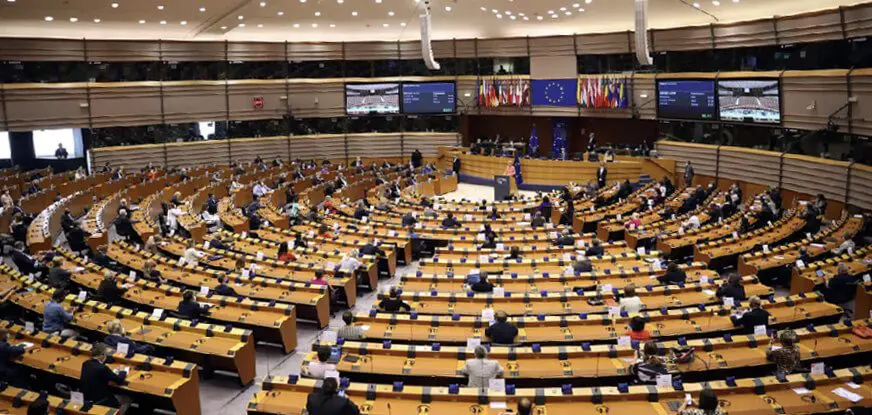Members of the European parliament will start belated scrutiny of the post-Brexit trade agreement on Monday, after EU and UK negotiators finally struck a deal on Christmas Eve.
The delays in finalising the agreement have left MEPs with no chance to approve the deal before it comes into force on 1 January. The European commission president, Ursula von der Leyen, will start a round of national and party consultations with MEPs.
MEPs from all factions are angry that they will be unable to scrutinise the deal fully in advance, but the chances of them rejecting it are low because the EU’s chief negotiator, Michel Barnier, has kept them fully informed throughout the talks.
Some MEPs, however, feel the sovereignty of the parliament has been systematically undermined either by Boris Johnson’s negotiating tactics or the commission’s indifference to MEPs right to ratify treaties.
Some German Green MPs have demanded greater scrutiny and clear sanctions if the UK breaks the rules, pointing to the plethora of joint committees and working groups that will now be set up between the UK and the EU.
MEPs have also called for more detail about how Brussels will be able to ensure a Conservative-led UK government does not use its new freedoms to diverge from key social and environmental standards in the years ahead.
There are no provisions in the deal to prevent the UK shifting to a lower tax economy, although in practice the deficits run up as a result of the coronavirus pandemic are likely to lead to tax increases in the coming years.
Many MEPs are also concerned about Brexit’s implications for the continued unity of the UK. Some insist the European parliament should make it clear it would welcome an independent Scotland joining the EU, a stance that would cause concern in Spain faced by a separatist Catalonia.
The president of the European parliament, David Sassoli, welcomed the deal on Christmas Eve and implied that most of its red lines had been preserved.
“The parliament is now ready to react responsibly in order to minimise disruption to citizens and business,” he said. “The parliament will continue its work in the responsible committees and the full plenary before deciding whether to give consent in the new year.”
Udo Bullmann, a German socialist member of the parliament’s trade committee said MEPs would “put the agreement through its paces over the next few weeks and then decide on its value. The rules on competitive conditions and market access will be examined in particular so that no new loopholes for dumping practices and tested EU standards arise.”
David McAllister, the parliament’s Brexit commissioner, said in an interview with Die Welt that the deal “would have far reaching consequences for people, companies and public administrations. Trade between the EU and the UK will no longer run as smoothly as it would when when we jointly tackled the internal market and the customs union.”
Iratxe García, the leader of the parliament’s socialist group, emphasised that the deal could not set a precedent for the way the commission consults the parliament on future trade deals. “This is a unique situation and there has and never will be an agreement quite like it, either in its nature or its procedure,” she said.
Pedro Silva Pereira, the socialist representative on the Brexit coordination group, said: “We will now analyse the final outcome of negotiations but, having had regular contact with the EU negotiating team, we believe that this agreement deserves our full support since it ensures a new relationship based on fair trade and high standards, avoiding social, environmental and regulatory dumping, and protecting our fishing communities.”
He is one of many MEPs who hopes the UK will come to see purpose in cooperating on a common foreign policy, something that is not covered by trade agreement.







